
October 4
1830 Belgium forms itself into an independent state, having been part of the Netherlands since 1815. One year after independence, Belgium will become a constitutional monarchy. In 1977 the country is divided into 3 regions: Flanders (the Dutch-speaking region in the north), Wallonia (the French-speaking region in the south), and Brussels, the capital region, which is predominantly Francophone.
1881 Birth: Walther von Brauchitsch: German general and field marshal-general from 1940:
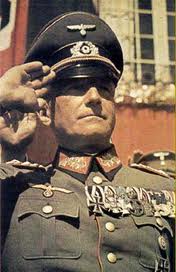
Commander-in-Chief of the German army (OKH) from February 4, 1938 until dismissed and forced to retire on December 19, 1941, by Hitler, who will assume the post himself. Brauchitsch will die on October 18, 1948, in the British Military Hospital at Hamburg.
1892 Birth: Engelbert Dollfuss: Austrian fascist chancellor:

Dollfuss will be assassinated in 1934 by eight Austrian Nazis who enter the Chancellery building and shoot him in an attempted coup d'etat, as a prelude to the Anschluss.
[See: Austria: The Other Germany.] October, 1908 (Exact Date Unknown):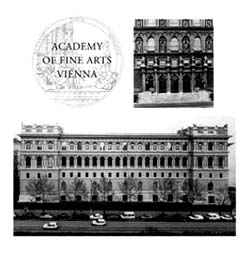
Adolf Hitler fails his art examination at the Academy of Fine Arts in Vienna for a second time (See: October 3, 1908).19
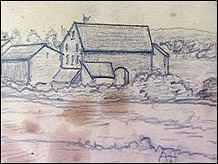
From the classification list of the Academy's 1908-09 school year:
The following gentlemen performed their test drawings with insufficient success, or were not admitted to the test: 24. Adolf Hitler, Braunau a. I., Twentieth of April 1889, German Catholic. Father: civil servant. 4 Realschulein. Not admitted to the test.

Apparently, Hitler's portfolio is even less promising than his entry of the previous year, as he is not even allowed to take the test. By his own admission, his depression is enormous. His failure to be admitted to the academy proves to be such a traumatic experience for him that he cannot even face his best friend, and soon moves out of their shared flat, leaving no forwarding address.20
[See: Did Hitler's Rejection From Art School Make Him Anti-Semitic?]1914 World War I: Various
List Regiment (Sep 1-Oct 7):
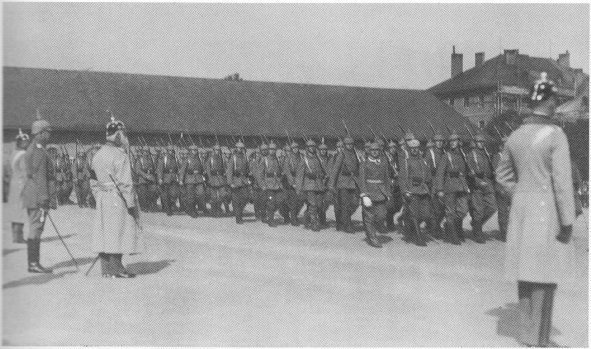
Infantry recruit Adolf Hitler's regiment continues a short but intensive basic training program, which is held in the premises of a large public school on the Elizabeth Platz in Munich. Hitler receives the first uniform of his life; basic greenish-grey with an "RIR 16" sown in red unto the epaulettes and a red stripe down the side of the trousers. The trousers are tucked into new leather boots, topped by a thick leather belt around the waist of the uniform jacket. [For further details, Click here.]
Zeppelin raid on London:
The German Zeppelin was sort of hovering over the building dropping bombs and they scored a couple of direct hits, causing massive explosions. We felt the blast two to three miles away. A few small bi-planes of ours went up to attack it but the Zeppelin had heavy machine-guns mounted in the cabin slung beneath it and, being almost stationary, could take careful aim on a plane. So our brave airman stood no chance. But one little plane went up, one of those double wing ones with all the struts holding the wings together. Well, this pilot flew above the Zeppelin and dropped bombs onto it. One hit it square on—flames started to light up the night sky. She was on fire all right. Everyone in the street started to cheer.
1915 World War I: Various:

List Regiment: Gefreiter Adolf Hitler's 16 Reserve Infantry Regiment continues to occupy a position at Fromelles—pictured above in a drawing by Hitler—on a level field with water channels, willow trees and willow stalks. In the distance towards the enemy lines lies an insignificant wood with barbed wire entanglements. Under the direction of their defense-minded commander, Lieutenant General Gustav Scanzoni von Lichtenfels, the regiment works ceaselessly day and night to further fortify their position at Fromelles while fighting off repeated assaults by the enemy. [For further details, Click here.]
The Champagne Offensive: regarded as the major Allied undertaking of 1915, quickly becomes bogged down in the face of determined German opposition. It will eventually be called off due to relatively little material advance. Nevertheless the French government will make much of those gains that are achieved (click here).
German Government Statement on the Champagne Offensive:
The object of the attack was to drive the Germans out of France. The result achieved is that the Germans on a front of about 840 kilometres, at one place 23 kilometres, and at another 12 kilometres wide (and at this latter not by any soldierly qualities of the English attack, but by a successful surprise by gas attack), have been pressed back from the first line of their system of defence into their second line, which is not their last. After a careful computation the French losses in killed and wounded and prisoners are at least 130,000, those of the English 60,000, and the German losses are not one-fifth of this number. Whether the enemy has still the idea of attaining his object need not be considered.
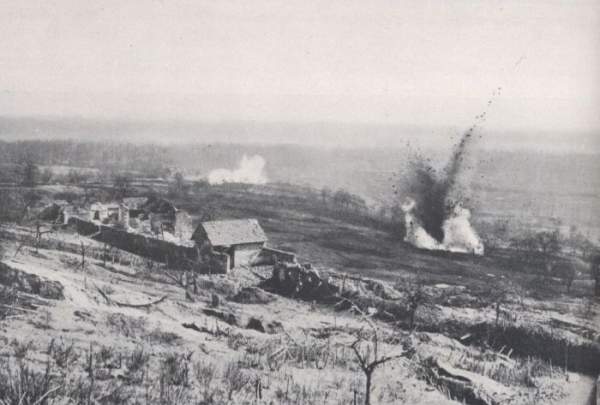
The 16th RIR relieves RIR 21 in trenches that are little better than connected shell holes. Balthaser Brandmayer, will later write:
Dead and buried everywhere . . . . We fell from shell hole to shell hole. Multicolored flares arched heavenwards and burst into countless streams. This was always the moment after which we leapt for another freshly turned-up crater in which to disappear . . . . Shrapnel, filth and iron rained mercilessly down on us. The blood almost stagnated in my arteries ... it could only be a few seconds longer - then, yes, then an armored-steel force ripped at bodies already scratched and torn . . . . My nerve failed. I just wanted to lie where I was, I sank hopelessly into insupportable apathy . . . . Then Hitler spoke kindly to me, gave me words of encouragement, said that someday all our heroism would be rewarded a thousand fold in the Fatherland . . . . We returned ... uninjured. Our faces were no longer recognizable. 31
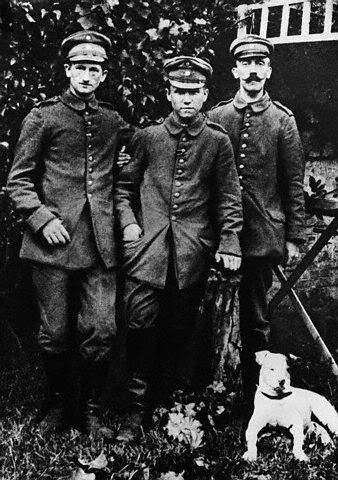
Schmidt, Amann, Hitler, Fuchsl]
1917 World War I: Various: (Sep 30-Oct 17):
Hitler takes an eighteen-day furlough to accompany Schmidt on a visit to his sister in Dresden with him. After sightseeing stops at Brussels and Cologne, they hit Leipzig, a city Hitler especially enjoys. He is impressed by the 300-foot tall monument, Battle of the Nations, honoring the war-dead of 1812. "This has nothing to do with art," he tells Schmidt, "but it is enormous and beautiful." After spending some time with Schmidt in Dresden, Hitler goes off by himself to Berlin to spend a few days with yet another front-line comrade. In a postcard to Schmidt, he writes: "The city is marvelous. A real world capital. Traffic is still tremendous. Am gone almost all day. Now finally have opportunity to study the museums a little better. In short: there is nothing lacking." [For further details, Click here.]
Battle of Broodseinde: The British devastate the German defence, prompting a crisis among the German commanders and causing a severe loss of morale in the German Fourth Army. [For further information, click here.]
1918 World War I: Various:
Argonne: General Pershing replaces a number of his assault divisions with rested troops from the Saint-Mihiel operation and renews the Argonne offensive. The US First Army batters its way slowly forward in a series of costly frontal attacks, but the Argonne Forest is finally cleared. The French Fourth Army, on the left, advances to the Aisne River.
Germany telegraphs President Wilson seeking armistice:
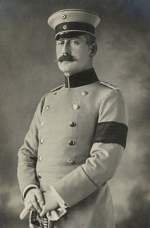
In the early hours of October 4, 1918, German Chancellor Max von Baden, appointed by Kaiser Wilhelm II just three days earlier, sends a telegraph message to the administration of President Woodrow Wilson in Washington, D.C., requesting an armistice between Germany and the Allied powers in World War I.
By the end of September 1918, the Allies had made a tremendous resurgence on the Western Front, reversing the gains of the previous spring's massive German offensive and pushing the German army in eastern France and western Belgium back to its last line of defenses, the so-called Hindenburg Line. Stunned and despondent, German General Erich Ludendorff, chief architect of that final spring offensive, reversed his previous optimism about the German military situation and demanded at a crown council meeting on September 29, that Germany seek an immediate armistice based on the terms President Wilson had laid out in his famous Fourteen Points address in January 1918. Feeling that the army's leadership had completely usurped the government, Chancellor Georg von Hertling immediately resigned; Kaiser Wilhelm subsequently appointed his second cousin, Prince Max von Baden, to the post.
As soon as von Baden arrived in Berlin to take office on October 1, he made it clear that he had no intention of admitting defeat until Germany had regained at least some ground on the battlefield; in this way he hoped to retain some powers of negotiation with the Allies. On October 3, however, Paul von Hindenburg, the German army's chief of staff and head of the Third Supreme Command-as Germany's military leadership was known-reiterated Ludendorff's advice, stating that "The German army still stands firm and is defending itself against all attacks. The situation, however, is growing more critical daily, and may force the High Command to momentous decisions. In these circumstances it is imperative to stop the fighting in order to spare the German people and their allies unnecessary sacrifices. Every day of delay costs thousands of brave soldiers their lives."
Von Baden disagreed with Hindenburg, telling him that too early an armistice could mean Germany would lose valuable territory in Alsace-Lorraine and East Prussia, which had been implicit under the terms of the Fourteen Points, despite Wilson's expressed desire for a "peace without victory." Deciding to seek his own way apart from the Supreme Command, von Baden brought two Socialist members of the German Reichstag into his cabinet; they too, appraising the growing anti-war feeling on the home front and in the government, advised the chancellor to seek an armistice. On October 4, heeding their advice, von Baden telegraphed his request to Washington.
Wilson's response, in notes of October 14 and 23, made it clear that the Allies would only deal with a democratic Germany, not an imperial state with an effective military dictatorship presided over by the Supreme Command. Neither Wilson nor his even less conciliatory counterparts in Britain and France trusted von Baden's declaration of October 5 that he was taking steps to move Germany towards parliamentary democracy. After Wilson's second note arrived, Ludendorff's resolve returned and he announced that the note should be rejected and the war resumed in full force. After peace had come so tantalizingly close, however, it proved even more difficult for Germans-on the battlefield as well as on the home front-to carry on. Within a month, Ludendorff had resigned, as the German position had deteriorated still further and it was determined that the war could not be allowed to continue. On November 7, Hindenburg contacted the Allied Supreme Commander, Ferdinand Foch, to open armistice negotiations; four days later, World War I came to an end. (History.com)
Austria joins Germany in requesting an armistice.
During the long pause in serious operations, the French and British Allies carried out sustained raiding and patrol activity. For example, in July the British fired an average of 14,000 shells a day on the Asiago alone. The German Army suffered a serious defeat on the Western Front in August, and the Austrians were left in no doubt that they could no longer count on German assistance: on the contrary they were asked how many divisions they could send to France. This had a crushing effect in Austria, and confidence melted away.
List Regiment: (Sep 28-Oct 15):
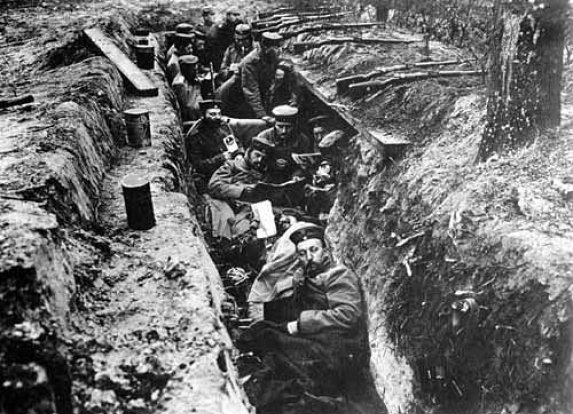
Gefreiter Adolf Hitler participates in defensive operations in Flanders with 3 Company, 16 Bavarian Reserve Infantry Regiment. [For further details, Click here.]
1930 Weimar: Hitler's testimony summed up by the President of the No. 4 Court of the Supreme Court of Leipzig:
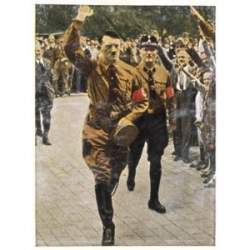
Adolf Hitler declared under oath, in quite unmistakable terms, that he intended to pursue his aims by strictly legal means, that it was only under duress that he adopted the course he did in Munich in November 1923 and that if he abandoned that course it was because illegal action as no longer necessary in view of the growing sympathy felt in Germany for the voelkisch liberation movement; he would he said, attain power in due course by legal means.
1933 Albert Einstein addresses a crowd of 10,000 in London's Albert Hall during the opening of a campaign to collect $5,000,000 for exiled German scientists:
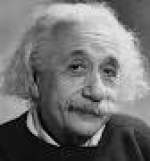
Nazi physicists and their followers violently denounced Einstein's theory of relativity as "Jewish-Communist physics." At times his friends feared for his safety. Such anti-Semitism was one reason why Einstein, although he believed in world government rather than nationalism, gave public support to Zionism. "In so far as a particular community is attacked as such," he said, "it is bound to defend itself as such, so that its individual members may be able to maintain their material and spiritual interests . . . . In present circumstances the rebuilding of Palestine is the only object that has a sufficiently strong appeal to stimulate the Jews to effective corporate action." But he objected to a law that required him to join the official Jewish religious community in Berlin. He said, "Much as I feel myself a Jew, I feel far removed from traditional religious forms.
1935: From William L. Shirer's diary:
The Wilhelmstrasse [metonymous term for the German Foreign Ministry] is delighted. Either Mussolini will stumble and get himself so heavily involved in Africa that he will be greatly weakened in Europe, whereupon Hitler will seize Austria, hitherto protected by the Duce; or he will go win, defying France and Britain (which are asking for sanctions of the League) and thereupon be ripe for a tie-up with Hitler against the Western democracies. Either way Hitler wins.
[See: How Did the Pact of Steel Effect Germany and Italy.]From Hermann Goering's IMT testimony:
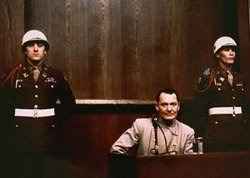
Then came the Italian-Abyssinian war. With regard to the sanctions against Italy, Germany was given to understand, not openly but quite clearly, that it would be to her advantage, as far as the Austrian question was concerned, to take part in these sanctions. That was a difficult decision for the Fuehrer to make, to declare himself out and out against Italy and to achieve the Anschluss by these means or to bind himself by obligation to Italy by means of a pro-Italian or correct attitude and thus to exclude Italy's opposition to the Anschluss.
I suggested to him at that time, in view of the somewhat vague offer regarding Austria made by English-French circles, to try and find out who was behind this offer and whether both governments were willing to come to an agreement in regard to this point and to give assurances to the effect that this would be considered an internal German affair, and not some vague assurances of general cooperation, et cetera. My suspicions proved right; we could not get any definite assurances. Under those circumstances, it was more expedient for us to prevent Italy being the main opponent to the Anschluss by not joining in any sanctions against her.
I was still of the opinion that the great national interest of the union of these German peoples stood above all considerations regarding the differences between the two present governments. For this to happen it could not be expected that the government of the great German Reich should resign and that Germany should perhaps be annexed to Austria; rather the Anschluss would have to be carried through sooner or later.
1936 Holocaust: Various:

Hans Frank draws up a program to remove all Jewish influence from German jurisprudence. (THP)
Jewish art dealers in Berlin ordered by the Reich Chamber of Culture to close their galleries by the end of the year. (THP)
Beginning in September 1933, a Reich Culture Chamber (composed of the Reich Film Chamber, Reich Music Chamber, Reich Theater Chamber, Reich Press Chamber, Reich Writing Chamber, Reich Chamber for Fine Arts, and the Reich Radio Chamber) supervised and regulated all facets of German culture. Nazi aesthetics emphasized the propagandistic value of art and glorified the peasantry, the 'Aryan,' and the heroism of war.
1938 Various:
Holocaust: German Jews' passports: On the advice of Swiss authorities, the letter "J" is to be printed on the front pages . (THP)
Ethiopia: The French Cabinet ratifies the decision to recognize Italy's conquest:
Mussolini had demanded 'ten eyes for every eye.' Some estimates place the total number of civilian Ethiopian deaths resulting from punitive actions of this kind at approximately a quarter of a million. As a result of its conduct of the Ethiopian campaign and occupation, Italy would become the first nation ever cited for crimes against humanity by the United Nations War Crimes Commission. From the seat of his government in exile in Bath, England, the emperor sought international support, with disappointing results. The United Kingdom and France recognized Italy's de facto administration of Ethiopia in April 1938. In one of his more comical gestures, Mussolini offered the exiled emperor money to recognize Italy's rights in his country.
1939 World War II: Various:
Reich Foreign Minister (Ribbentrop) to German Ambassador in the Soviet Union (Schulenburg):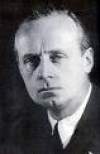
I, too, do not consider the method Molotov suggested for the cession of the Lithuanian strip of territory as suitable. On the contrary, please ask Molotov not to discuss this cession of territory with the Lithuanians at present, but rather to have the Soviet Government assume the obligation toward Germany to leave this strip of territory unoccupied in the event of a posting of Soviet forces in Lithuania, which may possibly be contemplated, and furthermore to leave it to Germany to determine the date on which the cession of the territory should be formally effected. An understanding to this effect should be set forth in a secret exchange of letters between yourself and Molotov.
Western Front: All French forces except for a light screen have withdrawn from Germany and returned to French territory. (THP)
1940 Holocaust: Vichy France: A new law gives Vichy France the power to intern Jews even outside the Unoccupied Zone. (THP)
The Germans invaded the northern part of France, which became known as the "Occupied Zone." The southern part of France was called the "Free Zone." This zone was located in the town of Vichy, which became the name of their government. Marshal Petain, a war hero, became president. The Germans tried to eliminate all the Jews living in France at the time, labeling them with JUIF (meaning Jewish). This labeling made it very difficult for Jews in France to continue living a normal life.
1941: From the Duty Book of Captain Shigeshi Uchida:
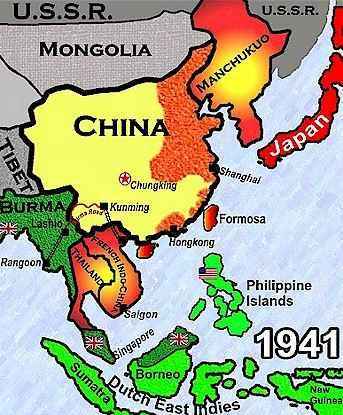
From the 1st until today a war game was held at the Army War College by the Army General Staff. Those who were slated to become staff officers of each Army of the Southern Army conducted the war game. (Commander Yamamoto and I) attended it (to represent the Navy's point of view). The main issue was a landing operation upon the east coast of Malaya. (Dillon)
[See: Countdown to Infamy: Timeline to Pearl Harbor.]1942 Various:
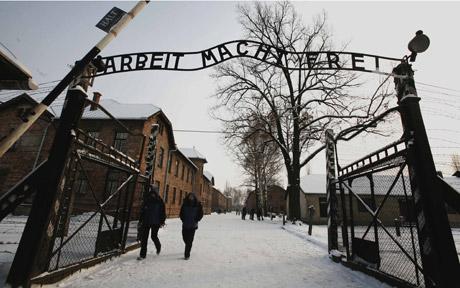
Holocaust: Beginning of deportation of all Jews from concentration camps in Germany to Auschwitz. (THP)
From a speech by Goering:
I have examined with very special care the situation in the occupied countries. I have seen how the people lived in Holland, in Belgium, in France, in Norway, in Poland, and wherever else we set foot. I have noticed that although very often their propaganda speaks officially of the difficulty of their food situation, in point of fact this is far from being the case. Of course everywhere, even in France, the system of ration cards has been introduced; but what is obtained on these ration cards is but a supplement, and people live normally on illegal commerce. The recognition of this has caused me to make a firm decision, creating a principle which must be rigidly adhered to. The German people must be considered before all others in the battle against hunger and in the problem of food supply. It is my desire that the population of the territories which have been conquered by us and taken under our protection shall not suffer from hunger. If, however, through enemy measures difficulties of food supply should arise, then all must know that if there is to be hunger anywhere it shall in no case be in Germany.
Stalingrad: XIV.Panzerkorps (von Wietersheim) launches an attack in force to capture the Tractor Factory in the northern part of the city.
Over 2,000 workers from the factories fought like lions. More than three battalions of infantry units armed with 1200 tommy guns in addition to supplies of machine guns, and rifles were formed from employees of all the factories. Men from the Tractor Factory drove 60 T-34 tanks into battle. Their comrades from the Barrikady Factory moved up three hundred excellent 76mm cannons. Supplies were so short that runners from the Tractor Factory football team dressed up in their jogging trousers, gaiters, leggings, and football boots to carry messages.
1943 Himmler's Speech at Poznan: Himmler summons his SS generals to Posen and informs them of the systematic murder of the Jews; in effect making accomplices of them all.
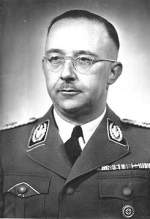
I also want to mention a very difficult subject before you here, completely openly.
It should be discussed amongst us, and yet, nevertheless, we will never speak about it in public.
Just as we did not hesitate on June 30 to carry out our duty, as ordered, and stand comrades who had failed against the wall and shoot them.
About which we have never spoken, and never will speak.
That was, thank God, a kind of tact natural to us, a foregone conclusion of that tact, that we have never conversed about it amongst ourselves, never spoken about it, everyone shuddered, and everyone was clear that the next time, he would do the same thing again, if it were commanded and necessary.
I am talking about the "Jewish evacuation": the extermination of the Jewish people.
It is one of those things that is easily said. "The Jewish people is being exterminated," every Party member will tell you, "perfectly clear, it's part of our plans, we're eliminating the Jews, exterminating them, ha!, a small matter."
And then along they all come, all the 80 million upright Germans, and each one has his decent Jew. They say: all the others are swine, but here is a first-class Jew.
And none of them has seen it, has endured it. Most of you will know what it means when 100 bodies lie together, when there are 500, or when there are 1000. And to have seen this through, and—with the exception of human weaknesses—to have remained decent, has made us hard and is a page of glory never mentioned and never to be mentioned.
Because we know how difficult things would be, if today in every city during the bomb attacks, the burdens of war and the privations, we still had Jews as secret saboteurs, agitators and instigators. We would probably be at the same stage as 1916-17, if the Jews still resided in the body of the German people.
We have taken away the riches that they had, and I have given a strict order, which Obergruppenfuehrer Pohl has carried out, we have delivered these riches completely to the Reich, to the State. We have taken nothing from them for ourselves. A few, who have offended against this, will be [judged] in accordance with an order, that I gave at the beginning: He who takes even one Mark of this is a dead man.
A number of SS men have offended against this order. There are not very many, and they will be dead men—WITHOUT MERCY! We have the moral right, we had the duty to our people to do it, to kill this people who wanted to kill us. But we do not have the right to enrich ourselves with even one fur, with one Mark, with one cigarette, with one watch, with anything. That we do not have. Because at the end of this, we don't want, because we exterminated the bacillus, to become sick and die from the same bacillus.
I will never see it happen, that even one bit of putrefaction comes in contact with us, or takes root in us. On the contrary, where it might try to take root, we will burn it out together. But altogether we can say: We have carried out this most difficult task for the love of our people. And we have taken on no defect within us, in our soul, or in our character.
1944 World War II: Various:
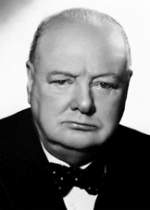
Churchill to FDR:
We want to elicit the time it will take after the Germans downfall for a superior Russian Army to be gathered opposite the Japanese on the frontiers of Manchukuo, and to hear from them the problems of this campaign, which are peculiar owing to the lines of communication being vulnerable in the later stages. Of course, the bulk of our business will be the Poles; but you and I think so much alike about this that I do not need any special guidance as to your views. The point of Dumbarton Oaks will certainly come up, and I must tell you that we are pretty clear that the only hope is that the Great Powers are agreed (i.e., unanimous). It is with regret that I have come to this conclusion, contrary to my first thought. Please let me know if you have any wishes about this matter.
FDR to Churchill:

I can well understand why you feel that an immediate meeting between yourself and Uncle Joe is necessary before the three of us can get together. The questions which you will discuss there are ones which are of course of real interest to the United States, as I know you will agree. I have therefore instructed Harriman to stand by and to participate as my observer, if agreeable to you and Uncle Joe, and I have so informed Stalin. While naturally Averell will not be in a position to commit the United States—and I could not permit anyone to commit me in advance—he will be able to keep me fully informed, and I have told him to return and report to me as soon as the Conference is over. I am only sorry that I cannot be with you myself, but I am prepared for a meeting of the three of us any time after the elections here, for which your meeting with Uncle Joe should be a useful prelude, and I have so informed Uncle Joe. Like you, I attach the greatest importance to the continued unity of our three countries. I am sorry that I cannot agree with you however that the voting question should be raised at this time. That is a matter which the three of us can, I am sure, work out together, and I hope you will postpone discussion of it until our meeting. There is, after all, no immediate urgency about this question, which is so directly related to public opinion in the United States and Great Britain and the United Nations. I am asking our military people in Moscow to make available to you our Joint Chief's statement to Stalin. You carry my best wishes with you, and I will eagerly await word of how it goes.
Ike warns of the risk of "shell shock":
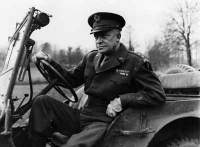
On this day in 1944, Gen. Dwight D. Eisenhower distributes to his combat units a report by the U.S. Surgeon General that reveals the hazards of prolonged exposure to combat. "[T]he danger of being killed or maimed imposes a strain so great that it causes men to break down. One look at the shrunken, apathetic faces of psychiatric patients...sobbing, trembling, referring shudderingly to 'them shells' and to buddies mutilated or dead, is enough to convince most observers of this fact."
On the basis of this evaluation, as well as firsthand experience, American commanders judged that the average soldier could last about 200 days in combat before suffering serious psychiatric damage. British commanders used a rotation method, pulling soldiers out of combat every 12 days for a four-day rest period. This enabled British soldiers to put in 400 days of combat before being deleteriously affected. The Surgeon General's report went on to lament the fact that a "wound or injury is regarded, not as a misfortune, but a blessing." The war was clearly taking a toll on more than just men's bodies.(History.com)
Greece: British troops are landed, occupying Patras.
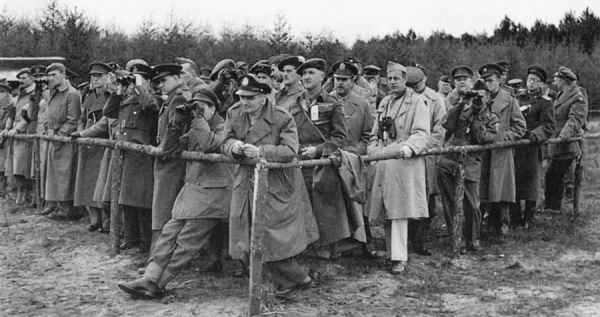
1945: The British successfully test-fire a second V-2 at Cuxhaven, but it only burns for 30 seconds, and falls far short of its target. (Piszkiewicz)
[See: Wunderwaffen: Hitler's Deception and the History of Rocketry.]1947 Spandau Prison: From Spandau: The Secret Diaries, by Albert Speer:
Today, by pressing the button installed in every cell, Funk activated the red disc in the corridor. This is the way we summon the guards. Monsieur Terray called through the hatch in his whispering manner: "I don't have a light. No light. No, nothing in my pocket." Funk teased: "But you always do have matches. There must be one in the other pocket." Terray insists: "I don't have any." Then, suddenly: "Oh yes, here!" Funk plays this game every morning and seems to enjoy it.

1957: A modified version of the R-7 Semyorka launch vehicle propels Sputnik 1, the world's first artificial satellite, into orbit. The big ball weighs 183 pounds and circles the earth at an altitude of 560 miles and a speed of 18,000 MPH. The reaction of Senator Lyndon B. Johnson: "We have got to admit frankly that the Soviets have beaten us at our own game—daring, scientific advances in the atomic age." (Fleming)

Sergey Pavlovich Korolyov, as quoted in The Russian Space Bluff by Leonid Vladimirov:
We [in the USSR] followed closely the reports of preparations going on in the United States of America to launch a sputnik called, significantly, Vanguard. It seemed to some people at the time that it would be the first satellite in space. So we then reckoned up what we were in a position to do, and we came to the conclusion that we could lift a good 100 kilograms (220 lbs.) into orbit. We then put the idea to the Central Committee of the Party, where the reaction was: "It's a very tempting idea. But we shall have to think it over." In the summer of 1957 I was summoned to the Central Committee offices. The OK had been given.




1959: The USSR's Luna 3 goes in orbit around the Moon, photographing 70 percent of the never-before-seen far side.
1990 Germany: First meeting of the reunified country's parliament is held in the Reichstag in Berlin.
Edited by Levi Bookin (Copy editor)
levi.bookin@gmail.com



Click to join 3rdReichStudies



Disclaimer: This site includes diverse and controversial materials--such as excerpts from the writings of racists and anti-Semites--so that its readers can learn the nature and extent of hate and anti-Semitic discourse. It is our sincere belief that only the informed citizen can prevail over the ignorance of Racialist "thought." Far from approving these writings, this site condemns racism in all of its forms and manifestations.
Fair Use Notice: This site may contain copyrighted material the use of which has not always been specifically authorized by the copyright owner. We are making such material available in our efforts to advance understanding of historical, political, human rights, economic, democracy, scientific, environmental, and social justice issues, etc. We believe this constitutes a "fair use" of any such copyrighted material as provided for in section 107 of the US Copyright Law. In accordance with Title 17 U.S.C. Section 107, the material on this site is distributed without profit to those who have expressed a prior interest in receiving the included information for research and educational purposes. If you wish to use copyrighted material from this site for purposes of your own that go beyond 'fair use', you must obtain permission from the copyright owner.
Please Note: The list-owner and moderators of 3rdReichStudies are not responsible for, and do not necessarily approve of, the random ads placed on our pages by our web server. They are, unfortunately, the price one pays for a 'free' website.